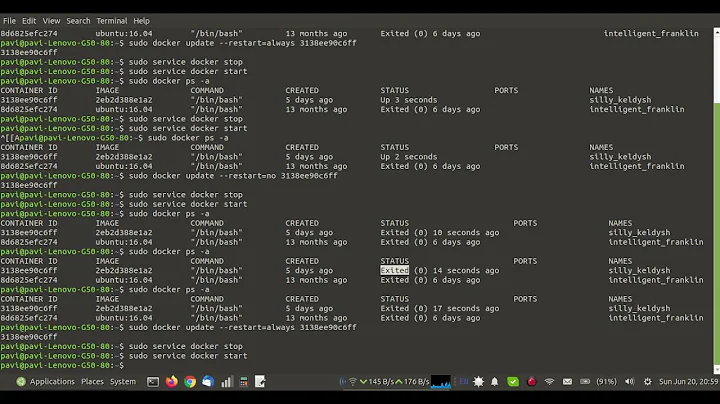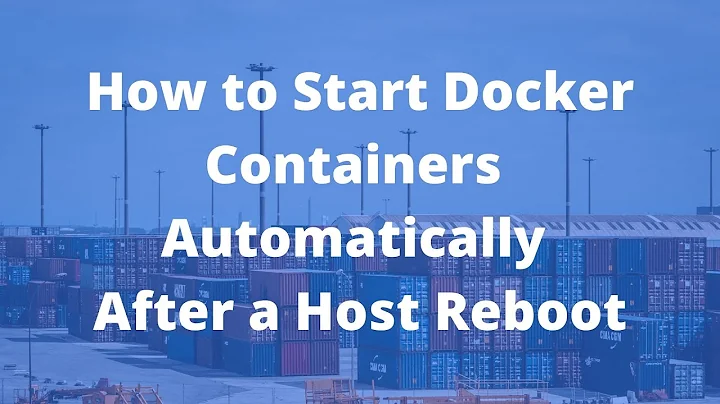How do I auto-start docker containers at system boot?
Solution 1
Apparently, the current method to auto-start Docker containers (from Docker 1.2) is to use restart policies. This will control how Docker should handle starting of the container upon startup and re-starting of the container when it exits. I've used the 'always' option so far, and can confirm that it makes Docker auto-start the container at system boot:
sudo docker run --restart=always -d myimage
Documentation Excerpt
Restart Policies Using the --restart flag on Docker run you can specify a restart policy for how a container should or should not be restarted on exit.
no - Do not restart the container when it exits.
on-failure - Restart the container only if it exits with a non zero exit status.
always - Always restart the container regardless of the exit status.
You can also specify the maximum amount of times Docker will try to restart the container when using the on-failure policy. The default is that Docker will try forever to restart the container.
$ sudo docker run --restart=always redisThis will run the redis container with a restart policy of always so that if the container exits, Docker will restart it.
$ sudo docker run --restart=on-failure:10 redisThis will run the redis container with a restart policy of on-failure and a maximum restart count of 10. If the redis container exits with a non-zero exit status more than 10 times in a row Docker will abort trying to restart the container. Providing a maximum restart limit is only valid for the on-failure policy.
Solution 2
Docker has this page that explains how to do it with upstart and systemd. I agree that it doesn't seem like the right thing for Docker. Their solution is to run docker start, which assumes that you've already created your container. I would think that you'd either do docker run --rm in the upstart script (treating it like a brand new process and container from an image) or just let the docker daemon restart the containers itself on boot (as it will by default if you do nothing else). Upstart has the advantage of allowing easy start/stop of processes, but you get that with docker's start/stop too!
I think it's weird to force the user to manually create a container (with all the correct port/volume bindings) before the upstart script will work.
Solution 3
But that doesn't feel like the right thing for Docker.
Why not?
I use supervisord for this with great success.
Use what you know, use what works, use something that you can easily maintain and understand.
Related videos on Youtube
Stefan Arentz
Updated on September 18, 2022Comments
-
 Stefan Arentz over 1 year
Stefan Arentz over 1 yearWhat is a good way to automatically start docker containers when the system boots up?
Is there a preferred way to do this on Ubuntu 14.04?
I've used
supervisordin the past to auto start web apps. But that doesn't feel like the right thing for Docker. -
 Stefan Arentz over 9 yearsThanks @EEAA .. does that mean you run them in non-daemon mode? Doesn't that also mean that you need to run them with
Stefan Arentz over 9 yearsThanks @EEAA .. does that mean you run them in non-daemon mode? Doesn't that also mean that you need to run them with--rm? -
 EEAA over 9 yearsI run the containers in foreground mode and let supervisord catch stdout/stderr. I'm not sure why
EEAA over 9 yearsI run the containers in foreground mode and let supervisord catch stdout/stderr. I'm not sure why--rmis relevant here. -
w00t about 9 years"always - Always restart the container regardless of the exit status" is a bit confusing. It won't restart the container if you manually exit/stop the container, which is the behavior I was looking for.
-
David Morales almost 8 yearsNote: another policy called
unless-stoppedwas added. It acts likealwaysbut If the container is stopped and the system is rebooted or the docker daemon is restart, the container will not restart. See here for a nice write up of all 4 options blog.codeship.com/… -
Daniel Alder over 7 years@EEAA: about your question: For some people,
dockeris a replacement forlxcoropenvzwhich havelxc.start.auto = 1andvzctl set --onboot yes. Also ESXi and other virtualization solutions have such a feature included. Like Lawrence, I also don't think such an autostart feature should be implemented in a distribution-specific way because a docker user should be able to solve the same problem with the same knowledge on every platform. -
sherrellbc over 7 yearsOf course, the
dockerdaemon must auto-start to support this. -
nijave over 6 yearsRight, Docker is a great way to decouple the host from running containers so using host-specific configuration is a bit of a step backwards.
-
Gert van den Berg about 5 yearsThe link is broken... This seems like a possible replacement, but it certainly does not show "how"
-
 Root Loop almost 5 yearsI think the question is asking "on system boot", meaning after the physical or virtual server rebooted, how the containers auto-restart, assuming docker engine is fully running after the server reboot?
Root Loop almost 5 yearsI think the question is asking "on system boot", meaning after the physical or virtual server rebooted, how the containers auto-restart, assuming docker engine is fully running after the server reboot? -
Digital Human over 4 yearsExactly @RootLoop. People read poorly




